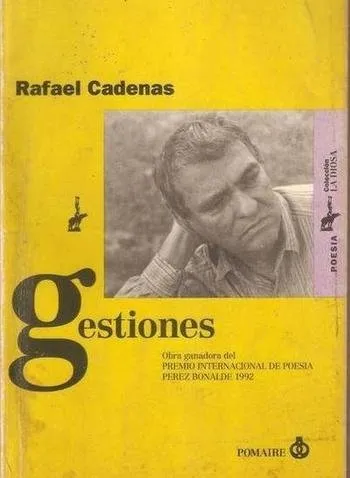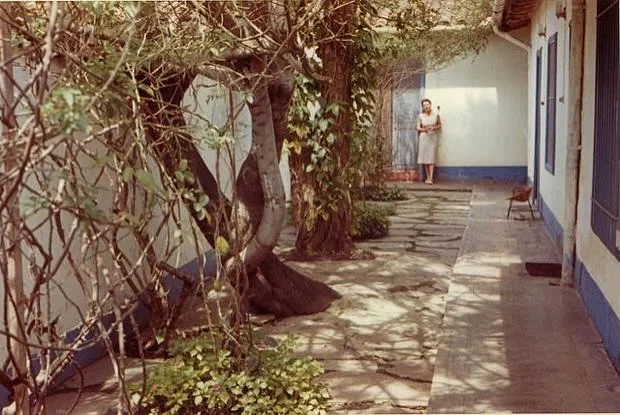
"Managements" by Rafael Cadenas or the poetry glimpsed (Part I)
After publishing two articles (1) and (2) on two books by the indispensable contemporary Venezuelan writer Rafael Cadenas (1930), I return with an article on another of his books from the most mature stage of his poetic production: Managements, book awarded the Pérez Bonalde International Poetry Prize 1992.
Although my original interpretative work is much broader, for obvious reasons, I only present the succinct approach to some of his poems.
***
Managements, in its title and content, confirms a characteristic of style: the option for the word austere and exact. See, for example, "Ars poetica" in Weather: "Let each word carry what it says", "I want terrifying exactitudes".
What does the word 'managements' mean? Cadenas (2000), trying to explain the title of his book, has expressed: "(...) they are managements within ourselves". We recognize a poetry that is thought and assumed as a diligence aimed at understanding the link between reality, experience and language; a poetry that is solicitation for the encounter with oneself and with the world, and, to such an extent, attempt and demand for meaning.
Managements is a heterogeneous book, in terms of themes and situations, which goes through different sections. The book opens with a loose, untitled poem that combines verse and prose, which is characteristic of the author.
Late return of the thread.
There were many years of disconnection from it, the old one, the never adorned one. Where was I wandering, suspended? For I never ceased to be the nerve of astonishment, to live on the shores, to go astray drinking a dark juice, but invading the buttresses of the day.
Transparency that I raised from the most harassed as a piece charged in the storm.
But the word was hidden.
To tend towards where it does not weigh and to move there dwelling.
The years have gone by and I did not stop recording falls. Then skin was only closure. Magic had not been destitute.
Now you come back, friend, and I receive you with presents torn from the executioner who watches over your territory.

We conjecture that the tacit "I" could be speaking of life-reality, but also of the word-poetry. The voice confesses its 'fault'. It recognizes that it late restores the continuity of something, an interrupted connection. But what connection is it?
We cannot restrict Cadenas' use of the word 'she' to a single meaning. It is ambiguity that makes it more suggestive. According to Isava, 'She' is woman, language and reality.
The valuation of the corporal, of the sensorial is relevant, because the sensations are the connection with reality in its most basic being; consequently, its negation or censorship constitutes a modality of detachment. Thus, the poem that opens the book introduces us to the vision of the "negotiations" carried out by the speaker. In the book we will notice that conscience that takes up again the thread, that requests and, at the same time, procures the encounter.
The first section of Management is entitled "Tribute". Among the meanings of the word 'tribute' is the one of admiration, veneration or recognition of something or someone. And it is this that will govern the poems: a humble reverence to the original reality, to childhood, to memory and to the word.
His first poem, also untitled, is the following:
I set aside the dream
when he left my childhood,
that accuracy.
Then
I belonged to you
without counterweight.
The gold of your patios
at noon
there's hardly any insinuation
when a sudden calmness
it brings me back.
I have walked
rooms,
solar energy,
corridors,
looking for you,
goddess of my whole days.
Registration
and I only find one man.
This word says my limit.
I live behind the wheel.

The voice vindicates childhood, conceived as the time or age of "accuracy. Childhood and dream seem to represent the kingdom of the original and the true, where one belongs, without conflict, to life. Part of that splendour of life is glimpsed, that gratuity of the real, when stillness reconciles us with the profound self; content expressed in the poem with vivid images: "The gold of your courtyards / at noon / hardly insinuates itself / when a sudden calm / returns me".
This presence is designated 'goddess', which means it as a manifestation of the sacred, which the affective memory has tirelessly requested in the rational spaces of the house and childhood (rooms, plots, corridors), places of a foundational daily life, nourishing sources of the interiority or the psyche.
The verb 'register' appears, a verb that, in addition to indicating the action of exploration, also refers us to the action of annotate, or write, as used in Annotations and in Lover ("I'm the one observing, /record, / write down..."). That search, to inscribe, only gives account of a condition and a truth to be accepted: "Register / and I only find one man. / This word says my limit". Thus, the final verse: "I live come in second", closes with the suggestive affirmation of the secondary and ungraspable experience and the strangeness.
Continues in next post.
References
Cadenas, R. (1983). Annotations. Venezuela: Edit. Fundarte.
Cadenas, R. (1983). Lover. Venezuela: Edit. Fundarte.
Cadenas, R. (1992). Gestiones. Venezuela: Edit. Pomaire.
Cadenas, R. (2000). Entrevistas. Venezuela: Edit. La Oruga Luminosa.
Isava, L.M. (1990). Voz de amante (Study on the poetry of Rafael Cadenas). Venezuela: National Academy of History.
Authored by @josemalavem
Click the coin below to join our Discord Server
